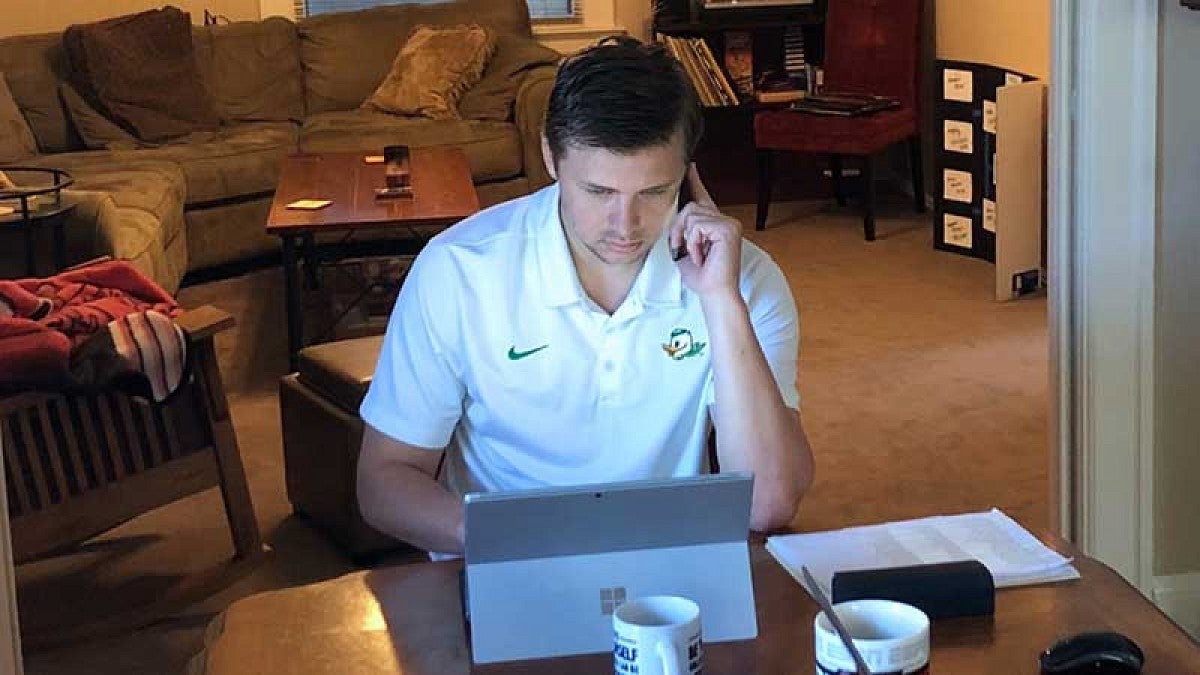How do you help more than 19,000 undergraduates pivot from spring term on the spectacular University of Oregon campus to remote learning? You ramp up your technology, quickly transform how you teach, and adapt.
And you personally check in with every single one of them.
“As we began our unprecedented transition to remote learning, it was essential to reach out to students and let them know they are not alone as they travel down this unfamiliar road,” said UO President Michael Schill, who personally called more than 200 students.
“I am grateful to everyone who took part in this extraordinary effort,” Schill said. “In the face of adversity, they responded enthusiastically to our call to action. Most were already working tirelessly from home to keep the university operating. Many were grappling with new parenting challenges or caring for others, as well as uncertainties the spread of the coronavirus has created. Yet they made the calls. The success of this initiative is a testament to the resilience of our university community and our commitment to the well-being of our students.”
Scott also said callers provided a myriad of details and resources that students needed to be aware of, such as academic support, technology and Wi-Fi support, accessibility support, and advising support.
“Fielding their questions, listening to their concerns and finding solutions required dedicated individuals who resolutely supported our students throughout this process,” she said. “Collectively, we helped many students remain enrolled and on track to graduate.”
Students who had received academic warnings or were on academic probation went to the top of the list. Next were students enrolled in support programs such as PathwayOregon, the Center for Multicultural Academic Excellence and TRIO student support services. The callers also prioritized first-year students, as they are generally least familiar with university coursework, policies and procedures, Johnson said.
“In a little over two weeks, we called 10,000 students,” she added. “Then we deployed the text messaging system and reached nearly 5,000 more. We prepared the callers with essential information to help them answer questions. We wanted students to know that, remote or in-person, we were committed to their success.
The team also worked to connect students with the resources they needed, including free Wi-Fi, loaner laptops, financial support and anything else to help them overcome obstacles on their path to a degree.
“Many didn’t know that tutoring and advising were available during this time of remote learning,” Johnson said. “We’re still here for them, 8 to 5 every day.”
“They’d ask, ‘Wait, who are you? Why are you calling?’ However, after that initial awkwardness, students would open up and ask questions,” she said. “They were all very grateful to hear a friendly voice from the university, even those who were doing OK and didn’t need anything. Some of the most heartwarming calls involved finding financial help or connecting students with resources.”
As the outreach effort continued, callers from areas across the university stepped up to help. Volunteers from University Advancement, the division that works to secure support for the UO’s mission, helped call juniors and seniors.
“It might seem like a stretch for fundraisers and advancement staff to call students,” said Mike Andreasen, vice president for university advancement. “However, this is right up our alley. Relationships are everything in our profession, and advancement plays a crucial role in engaging with the university’s constituents.
“By talking with so many students, and some of their parents, we learned more about how they were managing the current situation. It was a valuable opportunity to support the university’s core mission. And we heard, first hand, how the Students in Crisis fund is making a big difference.”
Chris Mueller, associate director of development for the Department of Intercollegiate Athletics, was the top caller for advancement by a long shot. A 2015 UO business graduate with a background in sales, Mueller had no qualms about making cold calls.
“Obviously, learning and working from home has been an adjustment for everyone,” said Mueller, who made more than 10 percent of the calls from the advancement team. “Imagine you’ve been attending this great university, and all of a sudden you’re studying at home. Then someone like me calls and says ‘I’m a volunteer, and I just wanted to make sure you’re OK. If you have a question, I’ll find the answer. If I can help, I’ll find a way.’ The students were very appreciative of that human interaction.”
—By Ed Dorsch, University Communications


